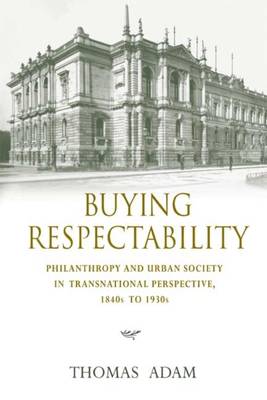
- Afhalen na 1 uur in een winkel met voorraad
- Gratis thuislevering in België vanaf € 30
- Ruim aanbod met 7 miljoen producten
- Afhalen na 1 uur in een winkel met voorraad
- Gratis thuislevering in België vanaf € 30
- Ruim aanbod met 7 miljoen producten
Buying Respectability
Philanthropy and Urban Society in Transnational Perspective, 1840s to 1930s
Thomas AdamOmschrijving
In 19th-century Leipzig, Toronto, New York, and Boston, a newly emergent group of industrialists and entrepreneurs entered into competition with older established elite groups for social recognition as well as cultural and political leadership. The competition was played out on the field of philanthropy, with the North American community gathering ideas from Europe about the establishment of cultural and public institutions. For example, to secure financing for their new museum, the founders of the Metropolitan Museum of Art organized its membership and fundraising on the model of German art museums. The process of cultural borrowing and intercultural transfer shaped urban landscapes with the building of new libraries, museums, and social housing projects. An important contribution to the relatively new field of transnational history, this book establishes philanthropy as a prime example of the conversion of economic resources into social and cultural capital.
Specificaties
Betrokkenen
- Auteur(s):
- Uitgeverij:
Inhoud
- Aantal bladzijden:
- 256
- Taal:
- Engels
- Reeks:
Eigenschappen
- Productcode (EAN):
- 9780253352743
- Verschijningsdatum:
- 1/04/2009
- Uitvoering:
- Hardcover
- Formaat:
- Genaaid
- Afmetingen:
- 165 mm x 236 mm
- Gewicht:
- 521 g

Alleen bij Standaard Boekhandel
Beoordelingen
We publiceren alleen reviews die voldoen aan de voorwaarden voor reviews. Bekijk onze voorwaarden voor reviews.











